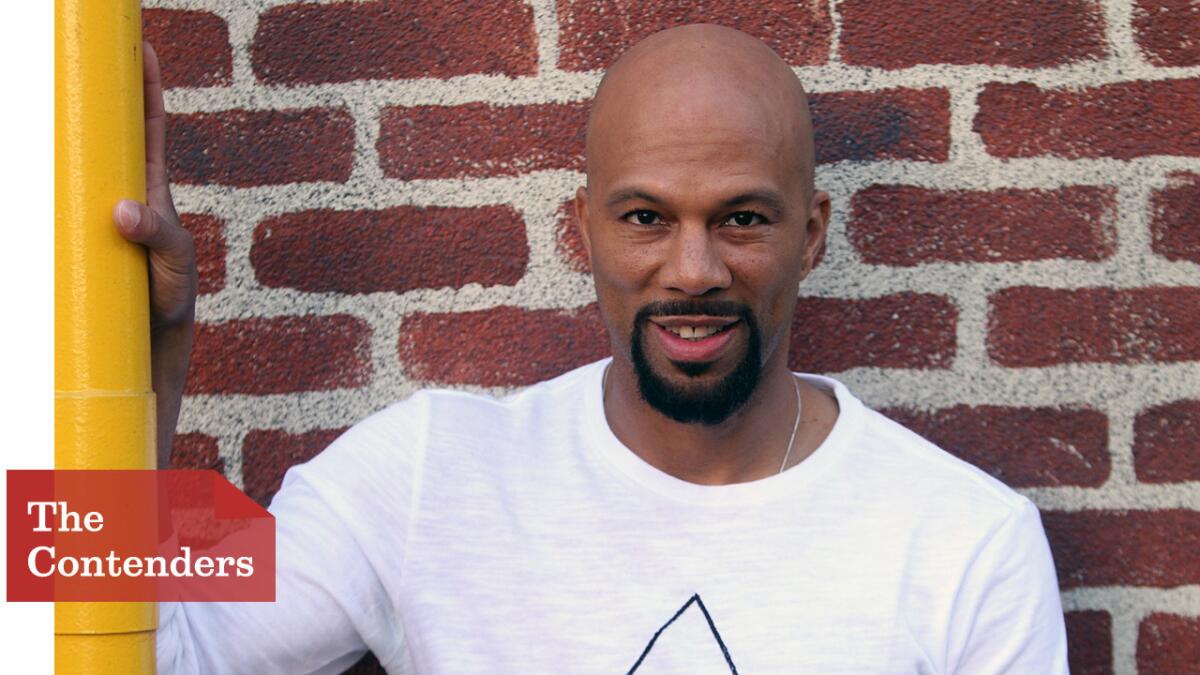For Oscar nominee Common, ‘Glory’ had to be majestic and radical

Lean and handsome, the man whose rap career began more than 20 years ago seems downright earnest when he talks about one of the most tumultuous times in American history.
“It started with love,” says Common, a rap star, poet, film and TV actor, and now an Oscar nominee, in a conference room on the Paramount lot. “One of the first things I learned about the civil rights movement, it started with love. Sometimes love is being able to stand up in the face of something that’s opposing you, not be violent, and stand up.”
Common (born Lonnie Rashid Lynn Jr.) is nominated along with nine-time Grammy winner John Legend for their stirring anthem “Glory,” written for best picture Oscar nominee “Selma.” Common acts in the film as well, portraying civil rights movement strategist James Bevel, who participated in the famous marches led by the Rev. Martin Luther King Jr. Common was delighted to be approached by director Ava DuVernay about playing Bevel, although he didn’t know much about the man.
“I just wanted to be a part of ‘Selma,’” he says, noting he initially became interested in the script four years ago, even before DuVernay came aboard. “This is really what I’m aligned with, something that’s very purposeful.”
When the film was in postproduction, DuVernay contacted him about writing a song for the film’s end credits.
“One thing she wanted was to show that the movement was radical,” he says of her marching orders. “Nonviolence is still radical. It’s still going against the grain. It takes a lot of strength to be nonviolent in the face of violence. She wanted it to have the majesty — Dr. King had something that’s majestic. The movie was epic but intimate. [The song] also had to be big, universal, speaking to all the multitudes of people. But it had to keep the radical aspects and the majesty — and the love.”
By way of example, he recites the song’s lines, “‘The biggest weapon is to stay peaceful.’ They said love was the greatest weapon they had. ‘Our music is the cuts that we bleed through.’ That’s love in the music.”
Before those lyrics came together, though, the rapper says he had an “epiphany” to recruit Legend to write the song’s musical framework and chorus. He reached the nine-time Grammy winner while Legend was touring Europe. Legend enthusiastically agreed, saying he had one day off: “I’m going into the studio on Wednesday,” he told Common.
“I said, ‘OK,’ and laid back down — I was in my bed,” says the rapper, “and these three titles came into my head. The third was ‘Glory.’ [Legend] took that title and wrote the piano part and the chorus [‘One day / when the glory comes / it’ll be ours / it’ll be ours’] and sent it to me. I got it that Thursday morning and said, ‘Oh, my God, this is beautiful and special.’ It hit my heart and my soul.”
While Legend’s chorus provides uplifting gospel sweep, Common’s rhymes can be hard-hitting. The song not only references Rosa Parks but also “why we walk through Ferguson with our hands up,” a reference to the protests in Ferguson, Mo., after the shooting death of unarmed black teenager Michael Brown by a white police officer.
“That shows the fight’s still going on. We’re still in the fight,” says the rapper. “Also, ‘One son dies; his spirit is revisiting us’ is playing on the Christian idea of the spirit of God being with you. But I’m also using the comparison of the young people being killed, whether it’s Jimmie Lee Jackson [from the Alabama marches depicted in ‘Selma’] or Mike Brown.
“The song is about winning the fight. ‘War is not over, victory’s not won,’ but one day it will be. If one group or nationality wins something and everybody else is not equal or given the same benefits, then everything’s out of balance. The war, the fight, the glory includes every walk of life, every nationality, every sexual preference. It’s all of us.”
The song also addresses the institutionalized racism of the time with the lyric, “I saw Jim Crow under a bald eagle.”
“Some of the injustices were being presented as the American Way,” Common says. “‘We have to keep America pure and clean.’ Like integrating with black people would make it dirty. ‘This is why you can’t use our water fountains or eat at the same restaurants,’ or ‘You don’t deserve the right to vote; it’s going to mess up the American Way.’ [America] wasn’t supposed to be based on inequality; it was supposed to be justice for all. But sometimes people can misuse the phrase ‘the American Way.’”
He’s interrupted by a phone call. It’s his grandmother.
“She really loves ‘Glory,’” he says, with a big smile. “She doesn’t listen to my music like that; different generation. She’s 86. She lived through this. She saw the film, she was moved by the film, ‘This song is incredible.’ That’s deep, man.
“This is the best project I’ve ever been a part of, from all aspects — what it’s given me as a human being and the impact it’s having in the world. It’s a proud moment to know that my daughter, who’s 17, my mother and my grandmother all went to see ‘Selma’ at the same time. And they took their friends. I’ve never been a part of anything that could bridge those generations. So this is definitely a proud moment.”
More to Read
From the Oscars to the Emmys.
Get the Envelope newsletter for exclusive awards season coverage, behind-the-scenes stories from the Envelope podcast and columnist Glenn Whipp’s must-read analysis.
You may occasionally receive promotional content from the Los Angeles Times.







